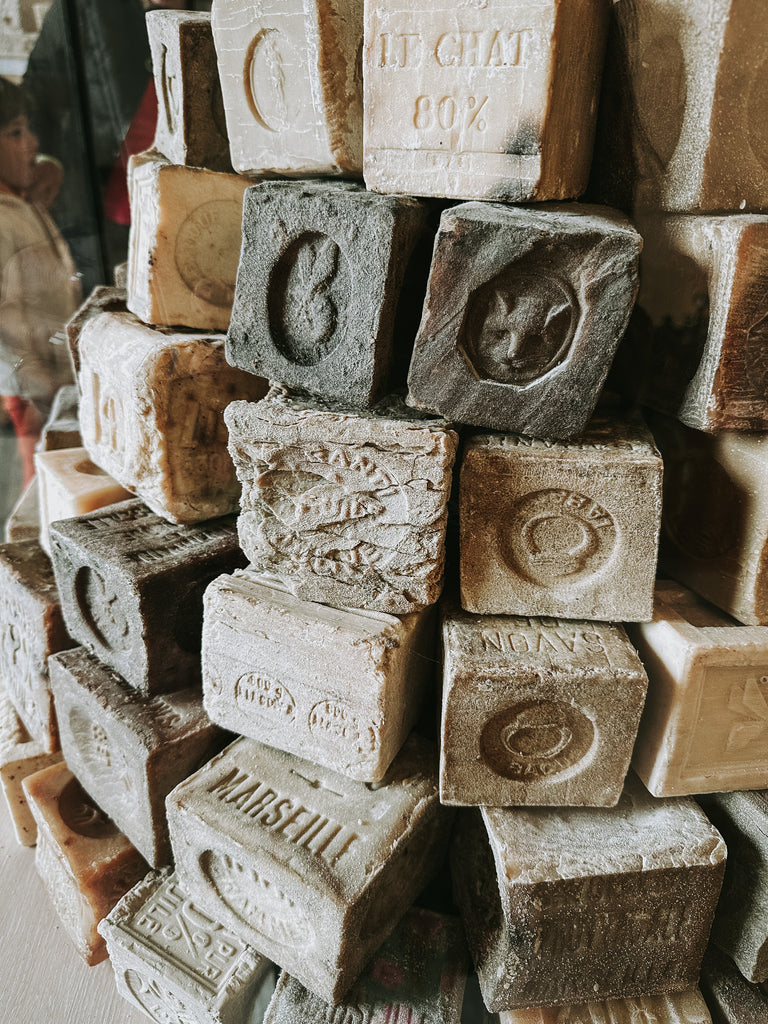Savon de Marseille. With its rich history and natural ingredients, Savon de Marseille holds a special place in the world of soap making.
Savon de Marseille, or Marseille soap, dates to the 9th century when soap-making techniques were introduced by Arab traders. The city, situated near the Mediterranean Sea, became a hub for trade, especially in olive oil, a primary ingredient in traditional Marseille soap. The abundant local resources of olive oil and ash from Mediterranean Sea plants provided the essential ingredients for soap production.
The traditional method of making Savon de Marseille involves a simple and time-honored process. It begins with mixing olive oil, along with other vegetable oils like palm oil or coconut oil, with alkaline ash obtained from sea plants. This mixture is then cooked in large cauldrons and allowed to undergo the saponification process. The resulting soap is poured into molds, cured, and cut into distinctive bars.
Olive oil is the heart and soul of Savon de Marseille. It has been the primary ingredient since the soap's inception. High-quality extra virgin olive oil is preferred for its skin-nourishing properties, mildness, and rich lather. The use of olive oil gives the soap its characteristic smoothness and moisturizing benefits. Nowadays, Alkaline ash is replaced by Sodium hydroxide, which is a crucial ingredient responsible for saponification, the chemical reaction that transforms the oils into soap. While lye (sodium hydroxide + water) is necessary, it should be handled with care and used in precise measurements to ensure a safe and effective soap-making process.
To ensure the authenticity and quality of Savon de Marseille, the Union of Marseille Soap Professionals established stringent regulations in the 17th century. These regulations mandated that the soap must contain a minimum of 72% vegetable oils, with no added synthetic fragrances, colorants, or preservatives. The soap also bears a stamp indicating its origin and authenticity. These are the primary ingredients required to create the authentic Savon de Marseille.
Savon de Marseille is a versatile soap with various uses. It is known for its exceptional cleansing properties, effectiveness in removing dirt and stains, and gentle care for sensitive skin. The soap can be used for personal hygiene, laundry, household cleaning, and even as a natural remedy for certain skin conditions. Its versatility has contributed to its continued relevance in modern times. It also gained acclaim for its natural and sustainable qualities. The soap is biodegradable, environmentally friendly, and contains no animal fats, making it a popular choice for those seeking eco-friendly alternatives. The soap's simplicity, coupled with the use of natural ingredients, aligns with modern desires for sustainability.
Savon de Marseille offers a glimpse into the soap's enduring appeal and cultural importance. From its historical roots and traditional production methods to its natural qualities and versatile uses, the production of Savon de Marseille is not merely a soap-making process; it represents cultural heritage and tradition. Marseille soap has become a symbol of the city's identity, craftsmanship and timeless beauty. The soap's iconic rectangular shape and the recognizable stamp evoke a sense of nostalgia and authenticity, connecting people to Marseille's history and the stories it carries within each bar.


Leave a comment